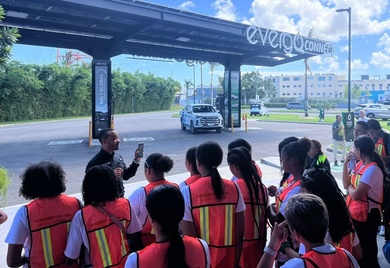Three Strategies to Include More People With Disabilities in Your Company

In Latin America and the Caribbean, 16% of the population lives with some form of disability, and 70% of these people are seeking employment. However, they face significant barriers that hinder their inclusion in the labor market.
Promoting their participation is a social commitment and a strategic decision that benefits companies. Here are five ideas to create inclusive spaces in your company:
Promote an Inclusive Internal Culture
Making the challenges and benefits of inclusion visible within an organization is the first step to reinforcing an inclusive internal culture. Through training programs, specific activities, and practical examples, it is essential to highlight the positive effects of integrating people with disabilities into the workforce, especially in innovation, flexibility, teamwork, and market expansion. Recent studies show how diverse teams can increase profits by 25%-36% and foster 20% more innovation.
Adapt Processes and Facilitate Access to Tools
Analyzing hiring, performance, and employee retention processes is essential to identify obstacles that hinder the incorporation of people with disabilities. Effective examples include adapting internal processes such as recruitment formats, interviews, hiring, or training. The average cost of a reasonable accommodation is only $300 per person, debunking the myth that these basic measures must be costly for the employer. Additionally, implementing technologies and functional supports can make a big difference. Tools like JAWS for visually impaired people, ergonomic keyboards, or adjustable furniture facilitate performance and allow companies to access an unexplored labor market with unique skills and talents.
Extend the Impact to the Value Chain
Extending inclusion practices to suppliers and strategic partners is crucial to promoting true social transformation and multiplying the generated benefits. According to some estimations, more than 1.3 billion people worldwide live with some form of disability. This is a market that demands accessible and adapted products and services, creating business opportunities for both direct service companies and suppliers.
Cultural Change
Starting the dialogue about labor inclusion may seem challenging, but it is essential to position it as a strategic and competitive opportunity that will generate social and economic returns.
Begin by highlighting measurable benefits, such as increased innovation and improved corporate reputation.
Propose an initial evaluation of organizational processes to identify barriers and involve leaders and collaborators in awareness sessions.
Inclusion is not just a policy but a cultural change that will position your company as a leader in diversity and sustainability.
JOIN A COMMUNITY OF 40,000 DEVELOPMENT LEADERS
GET THE LATEST ON OUR PROJECTS AND KNOWLEDGE

LIKE WHAT YOU JUST READ?
Subscribe to our mailing list to stay informed on the latest IDB Invest news, blog posts, upcoming events, and to learn more about specific areas of interest.
Subscribe



